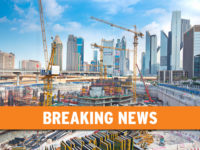2017 Economic Outlook for Cold-Formed Steel Framing

The incoming administration’s strong focus on rebuilding the nation’s infrastructure—driven by president-elect’s proposed 10-year, $1 trillion infrastructure plan—also will spur private investments in new residential and commercial construction and a concomitant demand for cold-formed steel framing and related products, according to Kathryn Thompson, CEO of the Thompson Research Group (TRG) and leading industry observer.
In a forecast prepared by her organization for the Steel Framing Industry Association, Thompson also notes that non-residential construction is nearing what historically would be considered a peak, but forward momentum is still present as the recovery follows a long, shallow, multi-year growth trend.
“Bipartisan federal and state support for rebuilding infrastructure—including highways, schools and hospitals, water systems and the electric grid—appears poised to help engender new private construction projects in areas served by that new and refurbished infrastructure,” Thompson said.
“Residential construction continues to grow, but not at the rate experienced in prior cycles,” Thompson added. “The strongest sector in the current cycle, multifamily construction, is cooling and may signal a shift to more single-family construction where there is room to grow to meet current needs.”
One of the tools used by the Thompson Research Group to track and interpret market directions is the TRG Building Product Survey, which collects information and opinions from building product distributors, buying groups, and manufacturers across the United States.
Just as in the prior year, those surveyed report that bottlenecks in the construction process—including labor and material shortages, and overly selective contractors who refuse projects—are affecting all segments of the market. Permitting also remains an issue.
“Architects in the eastern U.S. report that permitting is their biggest bottleneck overall,” Thompson said. “They report three- to six-month delays because of an inability to obtain permitting on time.”
At the same time, Thompson said, the new research reveals many reasons to anticipate further growth in 2017 in addition to the momentum provided by new infrastructure:
- 75 percent of respondents surveyed by the Thompson Research Group reported “Up” year-over-year volumes in steel studs in October 2016; and provided more overall consistent feedback of strong volume trends, which were up by mid-to-high single digits year over year
- Contractors reported that the volume of projects coming to market continues to improve, if at a somewhat slower pace.
- 46 percent of contractors reported increased bidding activity—particularly in the Healthcare, Education, Highway and Road, and Data Centers.
- 54 percent of sureties reported an increase in nonresidential bonding requests over the last three months year over year.
- The AIA Architectural Billing Index has been above 50 for 40 of the last 45 months, and architectural firms continue to hire in order to meet increased demand.
“This year’s survey indicates an overall positive outlook for 2017,” Thompson said. “In addition, the infrastructure dollars related to a potential federal stimulus plan would provide upside to 2018 and 2019. Based on our prior experience, those dollars would likely start flowing in a more meaningful way by mid-2018.”
Larry Williams, Executive Director of the Steel Framing Industry Association and host of the forecast, said that the steel framing industry appears to be one of the major winners in this scenario.
“The prospect of widespread multi-year economic stimulus resulting from new infrastructure projects presents a once in a generation opportunity to those who manufacture, distribute and install steel framing,” Williams said. “At SFIA, we will continue to work to help our industry make the most of this unique opportunity.”
To access the 2016 Market Forecast For Cold-Formed Steel Framing webinar, email - dpatel@latitudeworldwide.com
Looking for a reprint of this article?
From high-res PDFs to custom plaques, order your copy today!




